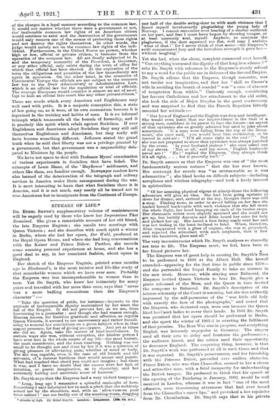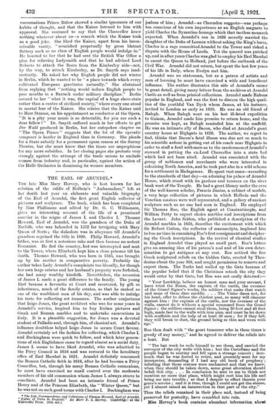'STREAKS OF LIFE.*
Da. EvmsL SMYTH'S supplementary volume of reminiscences will be eagerly read by those who know her Impressions That Remained. She gives a remarkable account of her old friend, the late Empress Eugenie ; she recalls two meetings with Queen Victoria ; and she describes with much spirit a winter in Berlin, where she had her opera, Der Wald, produced at the Royal Opera House, and where she had long conversations with the Kaiser and Prince Billow. Further, she records some amusing personal experiences at home, and she has a good deal to say, in her trenchant fashion, about opera in England.
Her sketch of the Empress Eugenie, printed some months ago in Blackwood's, is the most incisive and life-like study of that remarkable woman which we have ever seen. Probably the Empress was less incomprehensible to women than to men. Yet Dr. Smyth, who knew her intimately for many years and travelled with her more than once, says that " never was a more baffling conundrum than the Empress's character " :-- " Take the question of pride, for instance—keynote to the attitude of incomparable dignity maintained by her since the fall of the Empire. It did not prevent her, as we see, from kowtowing to a journalist ; and though she had reason enough, Heaven knows, for limitless gratitude and affection as regards Queen Victoria, it seemed to me unnecessary and rather humili- ating to eonceal her convictions on a given subject when in that august presence, for fear of giving annoyance. And yet at times she did so. Again, take the matter of kind-heartedness. In certain ways she was, without exception, the kindest- person I have ever met in the whole course of my life—the most lenient, the most considerate, and the least exacting. Nothing was too small to be thought out and done by her if it was a question of giving pleasure or alleviating pain, whether of mind or body. Yet she was capable, even in the case of old friends and old servants, of's curious hardness that would amaze and puzzle. What had touched that chord you could not imagine ; but there it was,- and I have no doubt that the causes were her lack of intuition, or poetic imagination, as to character, and her extremely halting and uncertain sense of humour."
Dr. Smyth says that the Empress had a very violent temper :— " Long, long ago I remember a splendid onslaught of hers. Something I said-infuriated her to such a pitch that she suddenly seized ins by the shoulders, and, with an allez-vous-en pour vous calmer 1 ' ran me bodily out of the smoking-room, dragging • Streaks of I4fs. By Ethel Smyth. London; Dwane. [105.-6d. set.] one half of the double swing-door to with such violence that I found myself involuntarily plagiarising the young lady of Norway. I cannot remember ever hearing of a similar outbreak on her part, and fear I must have begun by showing temper, or at least unseemly zeal, myself. Anyhow, to continue the plagiarism, if the door squeezed me fiat, well may I exclaim what of that 1' for I never think of that scene—the Empress's swift concentrated fury and the herculean strength it gave her— without laughing."
Yet she had, when she chose, complete command over herself. " Can anything transcend the dignity of that long iron silence ? " asks Dr. Smyth with reference to the Empress's steady refusal to say a word for the public ear in defence of the Second Empire. Dr. Smyth affirms that the Empress, though romantic, was not tender nor imaginative, and that her " skill as Caesar's wife ha avoiding the breath of scandal " was " a case of absence of temptation from within." Curiously enough, considering her fervent Catholicism and her attachment to the old order, she took the side of Major Dreyfus in the groat controversy
and was surprised to find that the French Royalists bitterly resented her attitude:— "Her love of England and the English was deep and intelligent. She would even insist that our improvidence is the trait of a strong race, confident in its power to face the future—an aspect of that optimism she so greatly admired but used to joke about sometimes. If a man were falling from the top of the Monu- ment,' she once said, you would hear him exclaiming, as he turned in mid-air : " It'll all come right in the end ' But she was not prepared to state that optimism was always justified by the event. Is your husband jealous ' she once asked one of my sisters. ' Not at all,' said my sister, English husbands never are No 1' replied the Empress, they always think it's all right, . . . but it generally isn't.' " Dr. Smyth assures us that the Empress was one of " the most fundamentally serious natures" that she has ever known. Her contempt for novels- was "-as Imreasonable as it was adamantine " ; she liked books on difficult subjects—including aeroplanes and wireless telegraphy—and took a lively interest in spiritualism.
" Of her amazing physical vigour at ninety-three the following adventure will give an idea. She had boon going upstairs to dress for dinrier,- and, arrived at the top, thought there was still a step. Finding none, in order to avoid falling on her face she hurled herself backwards with such violence that she fell down the whole flight, her head bumping on each of its twelve steps. Her rheumatic wrists were slightly sprained and she could not get up, but luckily Antonia and Aline heard her cries for help and picked her up. She hated a fuss being made over her and was not feeling in the least inclined to faint. When, therefore, Aline reappeared with a glass of cognac, she was so provoked, and rejected the stimulant with such emphasis, that it flew over the banisters, glass and all."
The very inconsistencies which Dr. Smyth analyses so shrewdly are true to life. The Empress must, we feel, have been as her friend pictures her.
The Empress was of great help in causing Dr. Smyth's Mass to be performed in 1893 at the Albert Hall. She herself attended—appearing for the first time in public since 1370— and she persuaded the Royal Family to take an interest in the new work. Moreover, while staying near Balmoral, the Empress invited Queen Victoria to hear Dr. Smyth give a piano rehearsal of the Mass, and the Queen in turn invited the composer to Balmoral. Dr. Smyth's description of the intense solemnity of the Court is amusing, but she was evidently impressed by the self-possession of the " wee little old lady with exactly the face of the photographs," and noted that the Empress, who destested caps, wore one because the Queen liked her Court ladies to oover their heads. In 1901 Dr. Smyth was promised that her opera should be performed in Berlin, and she spent the winter of 1901-2 in exacting the fulfilment of that promise. The Boer War was in progress, and everything English was intensely unpopular in Germany. The singers used all their arts to delay and frustrate the ,performance ; the audience hissed, and the critics used their opportunity to denounce England. The surprising thing, however, is that Dr. Smyth's work was performed at all in such times and that it was repeated. Dr. Smyth's perseverance, and her friendship with the Princess Billow, prevailed over endless obstacles. Prince Billow, who was then Chancellor, seemed. to her a clever and attractive man, with a fatal incapacity for understanding the British temper. He professed to think that his speech at the opening of the Reichstag in January, 1802, would be well received in London, whereas it was in fact " one of the most offensive, even threatening utterances that had ever issued from the Chancellor's suave lips," and provoked a hot rejoinder from- Mr. Chamberlain. Dr. Smyth says that in his private tonversations Prince Billow showed a similar ignorance of our habits of thought, and that the Kaiser listened to him with approval. She ventured to say that the Chancellor knew nothing whatever about us—a remark which the Kaiser took as a good joke. She liked the Kaiser, apart from his incon- ceivable vanity, " nourished perpetually by gross blatant flattery such as no class of English people would indulge in." He boasted to her that he had sent the British War Office a plan for relieving Ladysmith and that he had advised Lord Roberts to attack the Boers from the Kimberley side—not, by the way, to attack Kimberley, as Dr. Smyth says inad- vertently. He asked her why English people did not winter in Berlin, which he wanted to be " a place towards which every cultivated European gravitates naturally." She abstained from replying that "nothing would induce English people to pass months in a Barrack under military discipline." Berlin seemed to her " what it was, the capital of a huge slave-state rather than a centre of civilized society," where every one stood in mortal fear of the Kaiser. She relates that the Kaiser said to Herr Strauss, on his appointment as conductor at the Opera, `` It is a pity your music is so detestable, for you are such a dear fellow ! " Dr. Smyth suffered much in her efforts to get Der Wald produced in Berlin, but her outspoken chapter on " The Opera Fiasco " suggests that the lot of the operatic composer is harder in England than in Germany. She pleads for a State subsidy for a permanent opera season at the Surrey Theatre, but she must know that the times are unpropitious for any more subsidies. In her closing pages she protests very strongly against the attempt of the trade unions to exclude women from industry and, in particular, against the action of the Halle Orchestra in dismissing its women members.



































 Previous page
Previous page